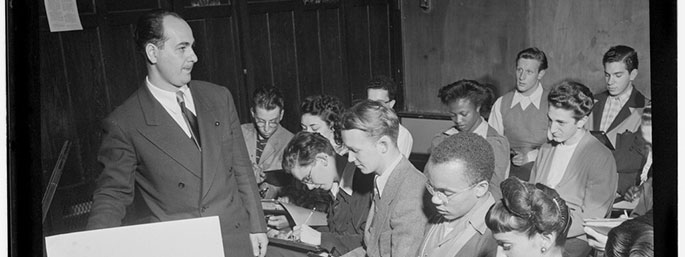There have been many outstanding reflections on the 60th anniversary of the Brown v. Board of Education decision. Our favorite was by Kaya Henderson, our former colleague here at TNTP and the current Chancellor of DC Public Schools. She reminds us that while we typically encounter Brown as a court case, it was about real families taking a real risk to challenge a dehumanizing system. They put their livelihood and safety in jeopardy. We are grateful to Kaya for reminding us that on occasions like this anniversary, we should be asking ourselves whether our own efforts live up to the standard set by these heroes in Kansas 60 years ago. – Tim Daly
On Friday, I had the honor of commemorating the 60th anniversary of the Brown vs. Board of Education decision at the White House, with President Barack Obama and the families involved in the five lawsuits responsible for the decision. It was an opportunity to witness history from a front row seat, as the President spoke about “standing on the shoulders of giants,” and the fact that he wouldn’t be where he was today was it not for Brown. The thing that struck me most, though, was not the eloquent words from the President, or Governor Deval Patrick of Massachusetts (who gets kudos in my book for the best impromptu speech EVER), or Secretary Arne Duncan. I was most impacted by a little old man who I sat next to at the reception before the program started.
He and his wife were in front of me in the line going into the White House. He kept stopping to take pictures of her in front of various parts of the building holding up the line. Instead of being frustrated, like I usually am, I thought it was charming. In fact, I volunteered to take a few pictures of the two of them so their friends wouldn’t think she was at the event by herself! They sat next to me at the reception after the wife, a teacher in Prince Georges County, recognized me as the Chancellor of DCPS. She introduced her husband, Mr. Emmanuel, as one of the original defendants in the South Carolina lawsuit (in addition to Topeka, KS, suits were brought by the NAACP Legal Defense Fund in DE, SC, VA and DC).
Mr. Emmanuel, a slight, African-American man well into his seventies was as quiet as his wife was chatty, until he got the chance to tell his story. He shared with me (after his wife started bungling the details) that he was 8 years old in 1951 when he and his family signed a petition to desegregate the public schools in his community, which was the first step in filing the suit. His family rented a farm from white landowners, who, when they heard his family was involved in “these shenanigans,” paid a visit to Mr. Emmanuel’s family. The white landowner told Mr. Emmanuel’s mother, “Lucretia, I heard that you’re planning on signing this petition. I just need to let you know that if you do, I’m going to have to put you off my place.” Mr. Emmanuel’s mother replied, “Well, I guess you’re going to have to put me off the place, because I’m signing the petition!” That night, she, her 8-year-old son, and others in their family signed the petition. The next morning, the landowners came and removed all of their things and dropped them off at the property boundary. Their family members and friends collected them and their things and they were able to re-establish themselves after some African-American landowners in town rented their land to the family.
Now, more than 60 years later, he stood in the White House, proud of the role that his family had played in changing the history of our country.
My encounter with Mr. Emmanuel sent my emotions swirling. I was proud of him and his family for being willing to sacrifice the little they had to do what they believed was right. I was reminded that regular, everyday people are the ones who can and will change the world. But most of all, I felt incredibly guilty that 60 years later, we haven’t lived up to the promise of Brown, that we haven’t honored the sacrifices made by Mr. Emmanuel, his family, and the many others who paved the way for a better educational system for ALL students, regardless of the color of their skin, or where they live. Each and every day, we work urgently, and tirelessly to provide the students of Washington, DC with a world-class education. Yet, many children remain segregated in high-poverty, struggling schools. While some of our schools are racially and socio-economically diverse, most are not. In fact, some are becoming even more homogenous. Many of our families desire the benefits of an integrated environment, and traverse the city, play the lottery, and do anything they can to get there, while others are trapped by lack of access and opportunity.
There are no easy answers to this issue. But I am reminded that regular, everyday people like us, and those who we serve, have to work together to figure out a different way to solve this problem that has continued to vex our country, 60 years after the courts took a courageous moral stand. We owe it to Mr. Emmanuel and his family to create a very different future for the children we serve. I hope the 60th anniversary of Brown provides each of you with the opportunity to recommit to the world-changing work that we do every day.








